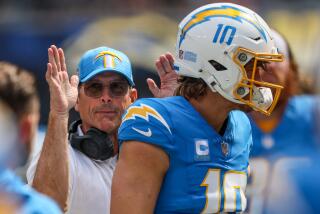Secret Oakland Raider cheerleaders’ handbook patronizes, demeans
- Share via
I have in my possession a copy of the super-secret official Oakland Raiderettes handbook, which outlines employment policies that are the subject of a class-action lawsuit, and also promises to teach “elite etiquette” to “football’s fabulous females.”
Someone sent it to me after I wrote about Lacy T., a 27-year-old Oakland Raiders cheerleader who has filed a class-action lawsuit against the team alleging multiple violations of California’s labor laws. My copy was not provided by Lacy, and it does not have names or contact information for other Raiderettes.
Lacy alleges that the Raiders seriously underpay the 40 or so professional dancers who make up the squad each year. Each earns a grand total of about $1,250 for a 10-game season, plus three practices per week, plus at least 10 public appearances, plus participation in the Raiderettes calendar photo shoot. Lacy figures she has been paid less than $5 an hour, a violation of the state’s minimum wage law.
The Raiderettes contract is included in the lawsuit. (Take a look at Rules 8 and 9 in Exhibit A. A Raiderette risks punishment for wearing curlers on her way to work or, God forbid, for chewing gum.)
A Raiders spokesman said Friday the team would have no comment on the lawsuit.
The handbook is patronizing and insulting, with outmoded ideas about men and women in the workplace, even if the workplace is not your average office. In places, it appears to be written for people unfamiliar with American customs, which is peculiar considering the uniquely American history of the game.
Still, here’s what the Raiders feel is important to impart to grown women, some of whom are married with children, all of whom have spent years of their lives training as performers on a public stage:
From the etiquette section:
“First Impressions: It takes 3-5 seconds to form a first impression of someone. Think about the last time you met someone for the first time. You probably looked at their hair, jewelry, facial expressions, style of clothes, shoes and nails….Keep nail polish pads in your car for emergencies. Smile, shake hands with everyone.”
“Proper Introductions: An introduction should be as immediate as possible…In American culture there are three basic elements to a proper introduction…” (That would be a smile, eye contact and a handshake.) A handshake, says the guide, “is an American custom that should be extended immediately upon introduction. A handshake should last about three seconds, be firm, and be web to web.”
“Dining etiquette” addresses how to eat food in front of other people, which the handbook describes as “one of the most intimidating areas of etiquette.”
“If you don’t like your meal, try a little of everything and strategically move the rest around your plate.” And, “Gently unfold your napkin and place it on your lap. Fold it almost in half and place it with the fold side towards your body. If you need to leave the table, place the napkin on your chair, and don’t forget to say, ‘Excuse me.’” (Yeah, excuse me while I throw up.)
A section called “Rehearsal Absentee and Missed Games Policy” lists fines incurred for missed rehearsals. Oddly--or perhaps illegally, as Lacy T.’s lawsuit claims--cheerleaders are not compensated at all for their thrice weekly rehearsals. That means any fines for missed practices are deducted from the paltry $125 they earn for each home game.
See if you can follow along:
“If you miss a Saturday rehearsal or weekday rehearsal (as in the final rehearsal prior to a game day performance), you will not be allowed to cheer that game. This means you will be fined 1 1/2 absences for the missed rehearsal and $125 will be deducted from your end of season pay for not performing on that game day. You will be notified if you are required to perform the pre-game and/or halftime routine and then remain in the dressing room for the duration of the game…Since three lates equal one absence and missing any rehearsal before a game is 1 1/2 absences, you can find yourself with no salary at all at the end of the season.”
Honestly, I’m starting to think cheerleaders are why God made labor unions.
And I’m not even going to go into the full page of instructions on how to care for the “Raiderette Medallion,” a nickel-plated necklace that must be kept free of hairspray, perfume, soap, shampoo, silver polish, powders, bronzers and toothpaste.
Finally, there is a section on fraternization. None of its provisions are mentioned in Lacy T.’s lawsuit. I showed it to her attorney, Leslie Levy, who said she did not find anything illegal.
As it happens, the handbook notes, the Raiders claim to be the only NFL team that does not have a policy forbidding dating and fraternization between the players and cheerleaders. That doesn’t mean the team won’t make life hell for a cheerleader who dates a player. “We STRONGLY prefer you do not date any of the players,” it says.
The handbook reminds Raiderettes that their contract says: “Excessive and/or improper fraternization with CLUB players or personnel will be grounds for dismissal.”
“Let’s discuss what excessive means to the Raiders,” the handbook says. “There have been a few relationships between the two groups that have resulted in a few happy marriages and lovely children. HOWEVER, we have also had more situations where, quite frankly, the Raider organization and the Raiderettes narrowly escaped ruined reputations.”
“One such example concerns a player who gave Halloween parties every year and many of the Raiderettes attended. This same player was suspended from the team for drug use but also arrested for date rape. For you on the squad who have attended those parties, just think how narrowly you missed having your photo in all the local papers and/or being assaulted.”
(Um, so a woman who is raped by a football player risks a ruined reputation?)
“For this reason,” the handbook screams, “RAIDERETTES ARE NOT ALLOWED TO ATTEND PARTIES AT PLAYERS’ HOMES…FOR THOSE OF YOU WHO DATE A PLAYER OR FORMER PLAYER, MAKE SURE HE UNDERSTANDS THAT PLAYER PARTIES ARE OFF LIMITS TO YOU.”
(That’s right, ladies: Raiders are rapists who can’t be trusted in social situations.)
“Make a point to find out if a player is married,” the handbook urges. “In most cases, he won’t tell you! You can call the Raider office with questions about marital status and I encourage you to do so. Again, he will not tell you he’s married!”
And let’s not leave out the wolves in the front office: “There are some young men on the Raider staff who are married and yet some of the Raiderettes like to call them ‘just to chat.’ No matter how innocent the friendship may be, the fact that you may pop in to visit them when you are in the Raider facility does not look good to others – particularly their wives!” (Who--what?--have stationed nanny cams on their husbands’ desks?)
“There’s not a female alive (or male either) who doesn’t like attention. But you need to learn to deal with attention you receive from the public (and especially the players) without it getting out of hand and going to your head.”
The fraternization warnings conclude with a threat:
“Fans would come to see the games whether or not we had cheerleaders. There are some great teams who do not have cheerleaders, such as the 2010 Champion Green Bay Packers. They are sold out every Sunday. Some teams who previously had cheerleaders do not now have them (Chicago Bears). Because of morality problems with their squads, they decided cheerleaders were too much trouble to deal with…DO NOT BECOME THE TOPIC OF CONVERSATION IN THE LOCKER ROOM AND/OR BY THE RAIDER STAFF. WE EVENTUALLY HEAR EVERYTHING.”
Ladies, whatever happens, it’s all your fault. And by all means, welcome to the team!
Twitter: @robinabcarian
More to Read
Go beyond the scoreboard
Get the latest on L.A.'s teams in the daily Sports Report newsletter.
You may occasionally receive promotional content from the Los Angeles Times.











